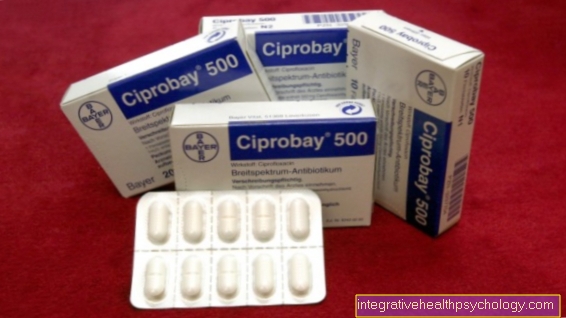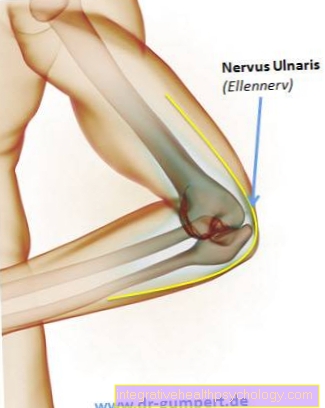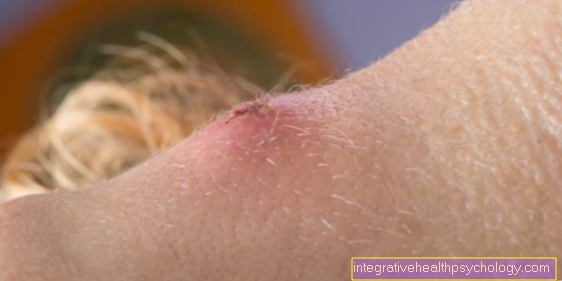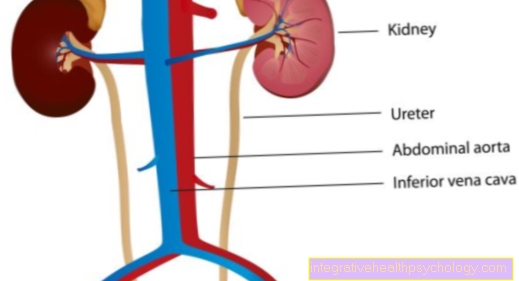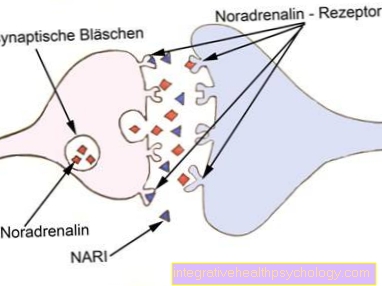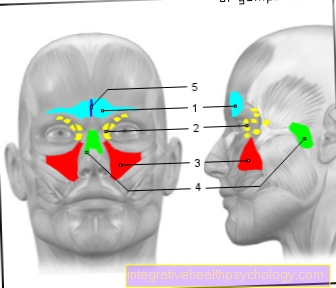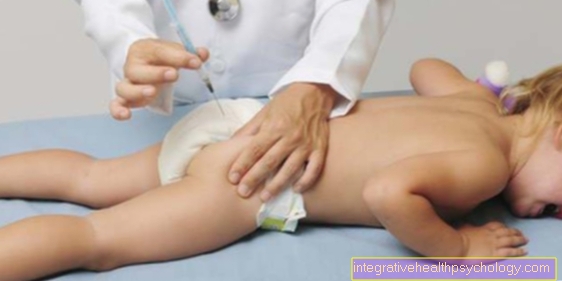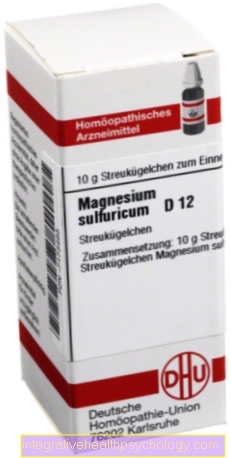Inflammation of the gums in pregnancy
introduction
Gum inflammation occurs in about half of all women during pregnancy. Depending on how the oral hygiene is maintained, the inflammation is more or less pronounced. The reason that gum problems occur more frequently during pregnancy are the hormones. Especially in the first 3 months of pregnancy, the estrogen balance changes in such a way that the hormones affect the blood circulation in the gums. As a therapy, many women reject antibiotic therapy. It is usually not necessary either. With appropriate dental care and suitable home remedies, gum inflammation can be combated without antibiotics.
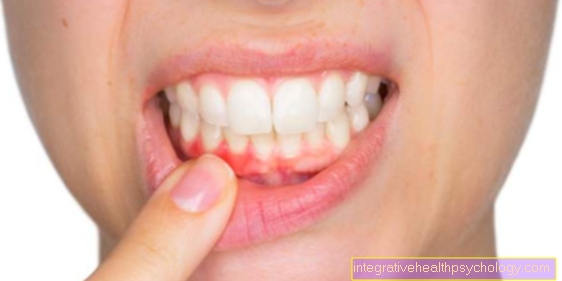
Symptoms
A sensation that occurs over time is pain when chewing or when touched and pressed. The hormone progesterone makes the vessels more permeable for blood cells, so that it leads to increased bleeding gums. Feelings of tooth loosening and wandering are not uncommon, but only occur in very advanced periodontal disease. Because of the close connection between the oral cavity and the temporomandibular joint, the pain can radiate there. The reason for this is that the function of the muscles is impaired by the inflammation. If the temporomandibular joint is unevenly and unevenly loaded, pain occurs. In addition, the pain can also pull into the ear. The muscles for the temporomandibular joint overlap with those for the ears. There is also a connection between the oral cavity and the middle ear. Another symptom is bad breath. It's a pungent, sour smell that smells like rotten food. In some cases the taste can also be changed.
What might also interest you:
- Toothache when chewing
- Bleeding gums during pregnancy
- Bad breath in pregnancy
- Symptoms of gingivitis
Pain
The problem with mild gum inflammation is that the gums don't hurt. The inflammation must have progressed further by the time pain occurs. The pain comes from the fact that bacteria attack the fiber system. It contains a large number of touch sensors that are increasingly activated and even destroyed. Pressure and touch hurt, especially with swollen gums. If the teeth become marginally loose over time, chewing will hurt even more. As a pregnant woman, you should use herbal and naturally occurring remedies for pain.
Read more on the subject at: Pain associated with inflammation of the gums
causes
Both the hormonal balance and the mother's immune system change during pregnancy. These changes encourage any kind of inflammation to take hold. The increased estrogen and progesterone levels caused by pregnancy expand the blood vessels. This makes it easier for the gums to bleed because the gums have receptors for the hormones that increase blood vessel permeability. In addition, the B and T defense cells and phagocytes, i.e. the cells responsible for the immune response, are present in reduced amounts in the blood.This does not adequately combat the bacteria in the oral cavity. A particularly large number of bacteria are in the mouth area during pregnancy, as the plaque, i.e. the dental plaque, accumulates a lot because the surface of the oral mucosa changes. In addition, there is often increased fluid retention in the cells, which causes the oral mucosa to swell. This makes it more difficult to clean and also promotes bacterial colonization.
What you should also read:
- Rash in pregnancy
- Pregnancy complications
- Edema in pregnancy
- Causes of inflammation of the gums
diagnosis
The diagnosis is relatively easy to make. When the gums change and the typical symptoms of gingivitis appear, everything points to this diagnosis. Among other things, the gums swell and they also turn red instead of pink. However, there can be differences in the type and severity of inflammation. Because every small injury to the gums leads to inflammation. Whether it is gingivitis, which is caused by bacteria, among other things, must be ascertained by the dentist. With certain measurements, he can determine whether and how the inflammation needs further treatment.
What helps?
On the one hand, to minimize the risk of gum inflammation or to alleviate the inflammation, one should switch to a soft toothbrush. Oral hygiene should also be improved. Dental floss and a light mouthwash should be used for daily care. The gums are particularly cared for with Meridol toothpaste.
In serious cases, professional teeth cleaning should be carried out several times. It is also helpful to pay attention to your diet. In particular, sugary and high-carbohydrate foods promote inflammation of the gums. Cooling helps against acute swelling. The oral mucosa should not be cooled directly as the cold could damage the tooth. It has to be cooled from the outside. Many pregnant women swear by Weleda build-up lime. You take a knife point each morning and evening. It supports the absorption of substances from food into the organism. It strengthens the tooth surface and strengthens the cohesion between roots and fibers. In order not to intensify the inflammation, rest should be kept. Exercise would lead to higher blood pressure. That is why you should sleep half-sitting so that excess fluid can drain off.
You might also be interested in the following articles: Professional teeth cleaning - how often is it necessary? and Procedure for professional teeth cleaning and medication for gum inflammation
Chlorhexamed
Since there are no adequate studies or investigations showing possible side effects during pregnancy, the use of chlorhexidine should be minimized. The dose should be discussed with the dentist beforehand. This should weigh up the risk and benefit of the drug against each other. However, if it is necessary to relieve gingivitis, it is better to cure the inflammation than to do without the drug. The advantage of the mouthwash is that you don't swallow it. The amount possibly ingested or accidentally swallowed is negligible. There is also chlorhexidine without alcohol if you want to avoid gargling with alcoholic agents during pregnancy. However, a gel or spray should be avoided. They tend to spread in the mouth and the active ingredient is absorbed very strongly through the mucous membrane.
Further articles can be found under the following link:
- Chlorhexidine
- Chlorhexamed® forte
- Betaisodona oral antiseptic
Home remedies
With many home remedies for gum inflammation, there is no need to worry during pregnancy. Especially with those that are of natural origin. Freshly poured teas with chamomile or sage are particularly effective. You shouldn't drink the tea, but use it as a mouthwash and then spit it out again. If you use ginger as a tea infusion for gargling, you absorb very little into the body's circulation. You shouldn't eat ginger during pregnancy. It is easy to induce labor. It is the same with clove oil. But since you only rinse your mouth with the clove oil and then clean it with water, the quantities are too small to be harmful. Oil pulling is also helpful during pregnancy. The decision is simply the choice of oil. Coconut oil, olive oil and mustard oil are harmless. Therapy with salt is safe. The ideal is to dissolve sea salt or Emser salt in a glass of lukewarm water and rinse your mouth several times with it.
Since vitamin C deficiency can be the cause of inflammation with bleeding gums, it is advisable to eat fruits with a high vitamin C content.
Also read the following article: Home remedies for gum inflammation and Bleeding gums due to deficiency
Tea tree oil
The active ingredients in tea tree oil are terpine and cineole. They are bactericidal, i.e. harmful to bacteria. In addition, the oil forms a connection with the bacterial wall. This is destroyed and thus the bacteria are also killed. For use in the mouth area, put 3-5 drops of the oil in a glass and dilute this with lukewarm water. Then gargle with this solution for 60 seconds. You can also divide the amount over several gargle units. You can also drip the oil onto the toothpaste and use it to brush your teeth. But you should avoid swallowing the toothpaste. Overall, tea tree oil is not dangerous to use while pregnant. As long as the drug is not swallowed in large quantities, it will not affect the baby.
Find out more about Tea tree oil
homeopathy
Treatment for gingivitis during pregnancy is not recommended in order to avoid possible anesthetic injections and surgical interventions. Homeopathic globules are suitable for preventing or fighting inflammation anyway. For example Mercurius solubilis. It is recommended to take 5 globules 3 times a day for 8-10 days. It helps with swollen gums that bleed quickly. The advantage of homeopathic remedies is that they do not have any side effects that could harm the mother or child.
Duration of inflammation
If the gingivitis is only caused by pregnancy, it should also withdraw with the birth. The problem with the inflammation is the changed hormone balance. The estrogen level does decrease after childbirth, but not directly and not quickly enough for the inflammation to subside within days.
In some women, this inflammation only occurs early in pregnancy. If you get a grip on it during this time, it quickly disappears. However, if it is not treated or if the appropriate hygiene is lacking, it can be carried off until after pregnancy. Breastfeeding after childbirth increases wound healing, so the gums heal better and faster.
Read more on the topic: Duration of a gingivitis
Do Inflamed Gums Suggest Pregnancy?
Since gum problems occur mainly in the first three months of pregnancy, the first sign of pregnancy may be gum inflammation. For example, if you have never had gum discomfort before and suddenly the symptoms of inflammation appear, it may be that the hormones are responsible. Otherwise it can also lead to hormonal changes. Together with stress and changes in life situation, the hormonal balance also changes. That is why one cannot speak of a certain sign of pregnancy in the case of spontaneous gingivitis.
Recommendations from the editorial team
Do you already know our articles on the topic:
- Inflammation of the gums
- Bleeding gums during pregnancy
- Symptoms of gingivitis
- Signs of pregnancy
- Causes of inflammation of the gums





